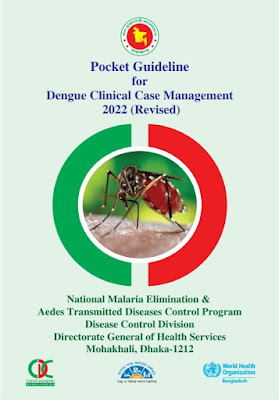National Dengue Guideline 2022 (Revised)
Pocketbook
DownloadNational Dengue Guideline 2018 (Revised)
Dengue fever is a viral illness transmitted by the Aedes mosquito, primarily the Aedes aegypti species. It is widespread in tropical and subtropical regions around the world, including parts of Southeast Asia, the Pacific Islands, the Caribbean, and Central and South America.
Here are some key points about dengue fever:
1. Causes: Dengue fever is caused by any one of the four related dengue viruses (DEN-1, DEN-2, DEN-3, and DEN-4), which belong to the Flaviviridae family.
2. Transmission: The primary mode of transmission is through the bite of infected female mosquitoes. These mosquitoes are most active during the day, especially during early morning and late afternoon.
3. Symptoms: Dengue fever typically manifests with symptoms such as high fever (up to 104°F or 40°C), severe headache, joint and muscle pain, rash, nausea, vomiting, and mild bleeding from the nose or gums. In some cases, it can progress to a more severe form known as dengue hemorrhagic fever or dengue shock syndrome, which can be life-threatening.
4. Diagnosis: Doctors usually diagnose dengue fever based on symptoms and physical examination, along with laboratory tests like blood tests to detect the presence of dengue virus antigens or antibodies.
5. Treatment: Currently, there is no specific antiviral treatment for dengue fever. The management primarily focuses on relieving symptoms, such as rest, hydration, and pain relief medications like acetaminophen (paracetamol). It is essential to avoid non-steroidal anti-inflammatory drugs (NSAIDs) and aspirin, as they can increase the risk of bleeding.
6. Prevention: Preventing mosquito bites is crucial in preventing dengue fever. This can be achieved by using mosquito repellents, wearing protective clothing, and eliminating mosquito breeding sites by getting rid of stagnant water where mosquitoes lay their eggs. In some regions, efforts to control mosquito populations are also undertaken.
7. Vaccine: There is a dengue vaccine available called Dengvaxia. It is approved in certain countries for individuals aged 9 to 45 years who have had a previous dengue infection. The vaccine is not recommended for individuals who have not been previously infected with dengue, as it may increase the risk of severe dengue if they are subsequently infected.

